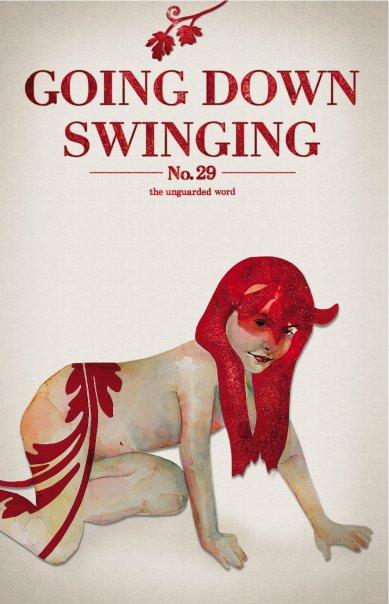 Going Down Swinging No. 29: The Unguarded Word edited by Lisa Greenaway and Klare Lanson
Going Down Swinging No. 29: The Unguarded Word edited by Lisa Greenaway and Klare Lanson
Going Down Swinging Inc., 2009
This was my first full dip into the reputable journal Going Down Swinging and so I started with the index. It is not often that you find entries of such intriguing fragments as ‘shoot a harpoon into its golden centre' or ‘the dark play of your wet eyes'. The entries that drew me in the most were ‘terrorism, blah blah' and ‘would sever the possum's head'. I played a fun game of fill in the blanks before tackling the serious issue of reviewing this delightful package of a journal.
This particular issue of the journal was enticing to me because the included CD was recorded at the Overload Poetry Festival, which offers a snapshot of the eclectic annual gathering of spoken word performers and enthusiasts in Melbourne. The CD captures the live audience right from the beginning, which becomes part of the performance from the first track. The track ‘Interlude' even includes audience participation, putting the listener right into the experience.
Where else but at Overload would you find a John Cage inspired incidental music piece alongside a poem entitled ‘Night Shift on the Dementia Floor' by Molly Case? It's this parataxis that makes Overload and GDS great bedfellows in my view. Themes vary throughout the CD, from the pedestrian (‘Storm coming' by Felix Nobis) to the inspirational (‘A Face to touch' by Benjamin Theolonius Sanders). The latter track's style borders on nauseating for me personally and thankfully only crops up once on the CD, but it seemed to get a rousing reaction from the crowd. It brings to mind soapbox preachers and is flavour of the month at poetry slams, due to the popularity of Def Jam in the US. Its inclusion here reminds me how GDS seeks to showcase diversity, and as Greenaway says in her editorial, what grabs readers is as unique as their thumbprints.
I took a pick and mix approach to my first reading, again using the enigmatic index. ‘Zarzamora' takes the reader to a work by prize winning American writer, Ahimsa Timoteo Bodhrán. That poets of his ilk are included here goes to show the international reach and reputation that the journal has established after 30 years of publication. Of course, popular Australian poets like Alicia Sometimes, Les Wicks and Emilie Zoey Baker still appear alongside emerging writers. Desh Balasubramaniam for example, is a man on a mission, spearheading a new arts and literature movement in Melbourne called Ondru. The Sri Lankan born writer's piece, ‘Open Fields', is one of the more evocative in the journal. It looks at life in a war zone, and its fragmentary style is reminiscent of an explosion:
to dry creek we crawl
two legged dogs
missing lay with rodents,
while telescopes of triggers
search for the last names
The next index entry I chose was ‘holding a pair of underpants up from his window'. This entry took me to ‘Whereabouts', a poem by Derek Motion from Booranga and former editor of FourW. It also happens to be the opening piece of the book. It is an almost farcical description of the antics of children, of which the ‘final moment of farce was the nameless boy holding a pair of underpants up from his window'. After this brief jaunt to the suburban cul-de-sac, I am then transported (in order) to North, Ruckers Hill, then to O'ahu Community Correctional Centre. Then, it's to the sunny northern hemisphere for the satirical and deprecating ‘Sunburns I Have Known and Loved' by Chris Flynn. I don't have much patience for short fiction, but I loved this piece:
Whilst I am no Pan, hairy-legged and cloven-hoofed God of the forest, I do possess a thick patch of ginger (don't laugh we're a very sensitive minority group you know) running from waist down to ankle. It's like wearing a pair of orange slacks. How could the sun possible harm me? Out of sheer pity, you would think he'd cut me a break.
A further flick through the book reveals the truth from editor Klare Lanson that the poets tend to be unguarded and fearless in what they expose, both on a personal level and in a public sense. As Ezra Pound said, ‘Artists are the antennae of society'; in other words, the reader might get a sense from reading this collection of witnessing an orientating of our times – a literary time capsule of the interior life of society in 2009. Of course, so much of fiction is pretence. ‘This is the first lie I have told in this tale', we are told by Sean Whelan. Sometimes though, fiction writers are the most fearless in peeling back the layers and getting to the heart of the matter. In anthologies such as GDS, what you find is a wonderfully rich soup of ideas and philosophies condensed (excuse the pun) and it takes several reads to really appreciate the ideas expressed. There is so much weight in every line. Some pieces seem to pride themselves on this laboriousness, forcing the reader to slow down and savour.
The poems and stories are nicely offset by some surrealist-type illustrations and the middle section is reserved for a graphic novella, ‘Where the Wild Things Aren't', by Melbourne cartoonist and illustrator Oslo Davis. It borders on film noir, and adds a light touch to the journal. In terms of the artistic side of the journal, I felt the cover to be enticing, if slightly provocative, and definitely eye-catching. Not only is it a sexy publication to own, but overall, it is simply a damn good read (and listen).
Anna Forsyth is a New Zealand-based author and musician. She has a website.









